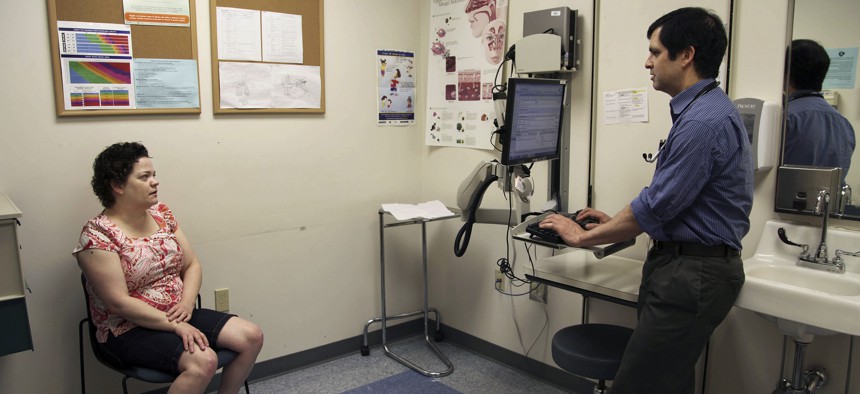The Supreme Court Is Bad for Your Health

A patient speaks with a primary care doctor at a clinic run by the Virginia Garcia Memorial Health Center in Beaverton, Ore. AP Photo
COMMENTARY | Its decision to let states opt out of the Medicaid expansion turned out to have lethal consequences.
Did Supreme Court Chief Justice John Roberts kill almost 16,000 people? That is one way, if a hyperbolic one, to read a new study on federalism and Medicaid. Economists looked at the long aftermath of the Court’s 2012 decision to allow states to opt out of the Affordable Care Act’s Medicaid expansion. They found that opt-in states experienced a 9.3 percent reduction in the mortality rate among near-elderly adults of lower socioeconomic status, adding up to thousands of lives saved. Opt-out states, accordingly, experienced thousands of avoidable deaths.
The study, conducted by government and academic researchers using large pools of health, income, and mortality data, demonstrates something reassuring and something discomfiting, particularly in light of Republicans’ ongoing efforts to repeal, alter, sabotage, or roll back the Affordable Care Act: Medicaid saves lives, and the country’s ongoing insurance crisis takes them needlessly away.
That first point continues to be a contentious one. Pathbreaking research on a Medicaid lottery held in the state of Oregon a decade ago found that people who got insurance felt far better, with coverage reducing both emotional and financial distress. But it had no effect on the physical-health measures examined during the study period, such as blood-pressure readings. People’s heads and wallets got better, but their hearts and lungs did not, the study indicated, nor did there seem to be any effect on the mortality rate.
If Medicaid does not make people healthier, it cannot save their lives either: This became a common argument in conservative circles, one wielded again and again against the ACA. “No one wants anybody to die,” Raul Labrador, an Idaho Republican and a former member of the Freedom Caucus, argued, for instance, pushing back on a constituent criticizing the GOP’s health plans. “That line is so indefensible. Nobody dies because they don’t have access to health care.”
But the Oregon study looked at health outcomes only over a short period of time, and at non-elderly adults who tend to have a pretty low death rate anyway. Other studies indicate that gaining coverage does have health and mortality effects. This new study is one of them. It looked at ample data on a targeted population—people nearing Medicare age, who live in poor households or do not have a high-school diploma—who tend to have poor health and for whom good insurance coverage might make a major difference. It does, the study found. Death rates dropped in the states that expanded Medicaid, saving 19,200 lives over four years. Had all 50 states expanded the program, 15,600 further deaths would have been averted.
These are the very real stakes of the health-care debate. The ACA saves lives. Universal insurance would save more. Although Republicans don’t see it this way, their health plans, which would result in fewer insured people, would also result in thousands of avoidable deaths each year.
In March, the Trump administration asked the courts to strike down the entire ACA, something that would not just dismantle the Medicaid expansion but also eliminate the insurance exchanges, stop requiring insurers to let children stay on their parents’ plans until the age of 26, strip away protections for patients with preexisting conditions, allow for insurers to reinstate lifetime coverage limits, and so on.
As this new study suggests, the Supreme Court may have altered the country’s health and mortality rates, too. Back in 2012, when the Court upheld the ACA’s individual mandate but allowed states to opt out of the Medicaid expansion, Court watchers expressed shock. New reporting from CNN’s Joan Biskupic suggests that the decision came about as part of a political negotiation among the justices: The mandatory Medicaid expansion—never one of the more legally controversial parts of Obamacare—was the cost of Roberts upholding the central tenets of the law.
For the poor, older adults of the red states that chose not to expand Medicaid, that negotiation may have been a lethal one.
Annie Lowrey is a staff writer at The Atlantic, where she covers economic policy.
NEXT STORY: Black Bears Adapt to Life Near Humans By Burning the Midnight Oil





